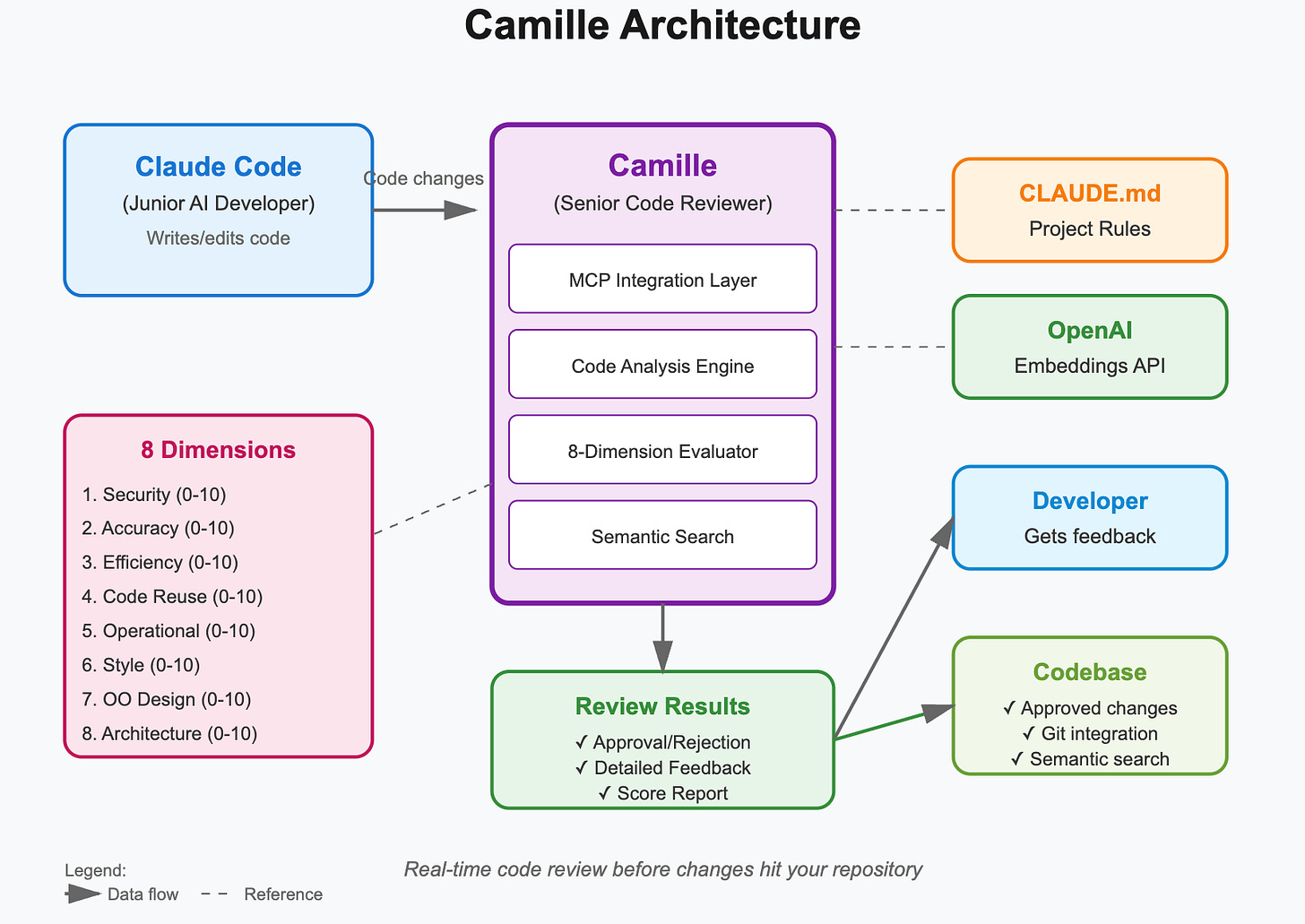Code So Fresh It's Still Dripping Wet Paint: Meet Camille, Your New Favorite Security Guard
Your AI intern wrote code. Now what?
Context: You know what I love about fresh code? Really fresh code? Code so new the pixels are still wet? It's like a newborn calf - wobbly, uncertain, probably going to fall over and cause a security breach that'll have your name trending on Hacker News for all the wrong reasons.
Which brings me to Camille: An open-source agent for automating Claude Code reviews before you commit them to GitHub.
Now, before you ask - no, Camille isn't my third cousin twice removed, though the name does have a certain je ne sais quoi. Camille is what happens when you realize that having your junior AI developer write code without a senior reviewer is like letting your teenager borrow the car without asking if they know what a stop sign is.
Remember that movie "Inception"? We need to go deeper. If AI is writing our code, who's reviewing the AI? That's right - another AI. But this one? This one's the senior engineer with 10 years of security experience and trust issues.
I have been developing collaborative, multi-agent panel services over the last few weeks, and I plan to bring this service to Camille in due course.

The Problem with Modern Development (A Brief Dissertation)
Let me paint you a picture. It's 2 AM. You're using Claude Code - a brilliant tool, by the way, an absolute marvel of engineering.
Think of it as your eager junior developer who never sleeps. You ask it to implement user authentication.
Claude, being the enthusiastic junior dev that it is, writes you a beautiful function. Gorgeous syntax. Elegant logic.
Also, it stores passwords in plain text because you forgot to mention the "cryptographic hashing" thing.
You see the problem?
Remember "move fast and break things"? That was Facebook's motto back in the early days.
It captured the spirit of Silicon Valley innovation - iterate quickly, learn from mistakes, push boundaries. Well, here's the thing about moving fast with AI-generated code: you don't just break things, you break them at scale. With style. With panache. With SQL injection vulnerabilities that would make a 2009 WordPress plugin blush.
I have personally seen Claude decide that an API that authenticates based only on a user ID is “A-ok” to push to production.
Enter Camille (Stage Left, With Purpose)
Camille is what we in the business call a "pre-flight check." You know how pilots go through that whole rigmarole before takeoff? "Flaps, check. Landing gear, check. Not about to execute arbitrary SQL commands, check." That's Camille.
Here's how it works - and pay attention because this is where it gets interesting:
% npm install -g claude-camilleOne line. That's it. I've seen more complicated toast recipes.
Once installed, Camille sets up shop as the senior engineer reviewing your junior AI's pull requests. Every time Claude Code tries to write, edit, or update a file, Camille steps in with a few questions:
"Excuse me, is that a hardcoded password? Because that's about as secure as a screen door on a submarine."
"I see you're concatenating user input directly into SQL. Bold choice. Wrong, but bold."
"No error handling? What is this, amateur hour at the Apollo?"
The Eight-Fold Path to Code Enlightenment
Now, Camille doesn't just wave a red flag and call it a day. No, no, no. It evaluates your code across eight dimensions - and before you ask, yes, I can name them all without looking at my notes:
Security (0-10): Because "hackable" isn't a feature
Accuracy (0-10): Will it compile? Do you know if it will run? Will it accidentally delete your production database?
Algorithmic Efficiency (0-10): O(n²)? In this economy?
Code Reuse (0-10): Why write it twice when you can write it right?
Operational Excellence (0-10): Logs, monitoring, all that jazz
Style Compliance (0-10): Consistency is the hobgoblin of little minds, but it makes code reviews bearable
Object-Oriented Design (0-10): SOLID principles, not LIQUID confusion
Architecture Patterns (0-10): Because spaghetti belongs on a plate, not in your repository
Each dimension gets a score. Your code gets a report card. Your future self thanks you profusely.
Currently, Claude Code really only cares if you block a hook, at which point it seems to care about the reason. Hopefully, in future versions, it will care more about the feedback it gets from hooks.
The Technical Wizardry (For Those Who Appreciate Such Things)
Here's where it gets properly clever. Camille uses OpenAI's embeddings - think of them as the DNA of your code - to understand not just what your code does, but what it means. It reads your CLAUDE.md file (you have one, right? Right?), understands your project's rules, and applies them with the dedication of a hall monitor who actually read the student handbook.
The MCP integration means it works seamlessly with Claude Code. No context switching. No copy-pasting into a separate tool. It's like having a brilliant, slightly obsessive colleague looking over your shoulder, except this colleague never needs coffee breaks and has memorized every CVE ever published.
The MCP server also runs across different Claude projects. This enables Claude Code to search across an entire codebase. This is currently an in-memory store of vectors. I plan on extending this with an inbuilt Redis deployment.
But Wait, There's More (As They Say in the Trade)
Camille doesn't just review code. Oh no. It's also a search virtuoso. Ask it to find "authentication logic" and it'll use semantic search - not just string matching, but actual understanding - to locate every place in your codebase where you're dealing with auth. It's like having a bloodhound that went to MIT.
The Part Where I Ask You for Something
Now, here's the thing about open source projects - they're like barn raisings. Remember barn raisings? No? Well, the point is, they work better when people show up.
Camille is Apache 2.0 licensed, which in layman's terms means "take it, use it, make it better, just don't blame us if something goes sideways." We need contributors. We need people who look at this code and think, "You know what would make this better? If it also checked for..."
Whatever comes after that "if" - that's what we need.
The Philosophy Bit (Bear with Me)
You know what they say about opinions and... well, never mind. The point is, everyone's got one about AI. But here's what I think: In the digital world, nothing exists except ones and zeros; everything else is interpretation. And if we've learned anything from the last decade of tech mishaps - from Equifax to Colonial Pipeline - it's that interpretation without verification is how you end up explaining to Congress why half the Eastern Seaboard can't get gas.
And interpretation? That's where the trouble starts.
When we let AI write code without review, we're essentially saying, "I trust this pattern recognition system to understand not just syntax, but semantics, security, and the subtle art of not shooting myself in the foot." That's a lot of trust to place in what is, fundamentally, a very sophisticated autocomplete.
Camille is our hedge against that trust. It's the designated driver at the AI party. It's the friend who checks your text messages before you send them to your ex at 2 AM.
In Conclusion (Finally, I Hear You Cry)
Look, I could go on. I could tell you about the elegant Python proxy that handles the MCP protocol. I could wax poetic about the hook system that intercepts code changes before they hit your repository. I could channel my inner TED Talk and tell you why this matters for the future of humanity.
But here's what you need to know:
Install Camille:
npm install -g claude-camille(NPM Package)Run the setup wizard:
camille setupSleep better at night knowing your AI assistant has adult supervision
Because at the end of the day, the question isn't whether AI can write code. We know it can. The question is whether we're smart enough to check its work.
And if we're not? Well, to err is human.
But to really mess things up? That takes unsupervised artificial intelligence.
Want to contribute? Think Camille could be better? Of course you do. You're a developer. Thinking things could be better is literally your job description.
GitHub: github.com/srao-positron/camille


